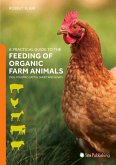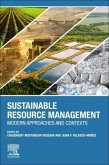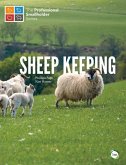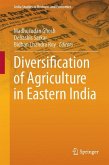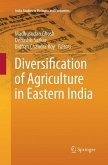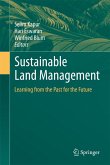Guild Of Food Writers Awards 2025 shortlisted
How has it come to this point in our history that we hardly value the food we eat and the soil that it's grown in? How is it that we care so little how food production impacts animals and the environment?
Industrial farming has transformed Britain's rural landscapes, increasing crop yields and reducing hunger. Yet this has all come at a terrible ecological cost. It is 'both a miracle and a disaster'.
Six Inches of Soil, the film and this companion book, is the inspiring story of three British farmers standing up to the industrial food system and transforming the way they produce food - to heal the soil, benefit our health and provide for local communities.
Six Inches of Soil is a story of courage, vision and hope. This book is not just for farmers. Reconnecting with our food, and regenerating our soils, ourselves and our communities benefits everyone and needs everyone to be involved. We want to inspire farmers with the confidence and practical know-how to adopt regenerative farming approaches. We want to give consumers the impetus and information to rethink their food choices.
This book and the film are closely related but stand on their own. In these pages you will find detailed chapters on each of the three farmers that provide replicable case studies and inspiration. Additionally, there are chapters examining the problems with the current agri-food system and proposing solutions and a vision for the future. Recognised experts: explain agroecological farming systems and soil science; consider the issues of land use, greenwashing, subsidies, food security; and provide examples of agroforestry applications, and farm enterprise stacking and diversification.
Their three stories are inspiring, guiding and frustrating. Allow yourself to be inspired, to be guided and to turn your frustration in to action.
How has it come to this point in our history that we hardly value the food we eat and the soil that it's grown in? How is it that we care so little how food production impacts animals and the environment?
Industrial farming has transformed Britain's rural landscapes, increasing crop yields and reducing hunger. Yet this has all come at a terrible ecological cost. It is 'both a miracle and a disaster'.
Six Inches of Soil, the film and this companion book, is the inspiring story of three British farmers standing up to the industrial food system and transforming the way they produce food - to heal the soil, benefit our health and provide for local communities.
Six Inches of Soil is a story of courage, vision and hope. This book is not just for farmers. Reconnecting with our food, and regenerating our soils, ourselves and our communities benefits everyone and needs everyone to be involved. We want to inspire farmers with the confidence and practical know-how to adopt regenerative farming approaches. We want to give consumers the impetus and information to rethink their food choices.
This book and the film are closely related but stand on their own. In these pages you will find detailed chapters on each of the three farmers that provide replicable case studies and inspiration. Additionally, there are chapters examining the problems with the current agri-food system and proposing solutions and a vision for the future. Recognised experts: explain agroecological farming systems and soil science; consider the issues of land use, greenwashing, subsidies, food security; and provide examples of agroforestry applications, and farm enterprise stacking and diversification.
Their three stories are inspiring, guiding and frustrating. Allow yourself to be inspired, to be guided and to turn your frustration in to action.
The importance of soil health, and its enormous impacts on the food we eat as well as the surrounding wildlife and the soil's longevity is becoming ever more obvious. Films certified-teacher-training and books like this have been bringing real-life examples of how regen ag, permaculture, agroecology etc., not only produce nutritious local food and provide local jobs, but also lock in carbon and nurture a diversity of native creatures, above and below the ground.
As an extension of the popular film, we meet three farmers from very different settings: A pasture-fed beef farm in Cornwall; an organic market garden in Cambridgeshire and a regenerative mixed farm in Lincolnshire. They are all fairly early in their regen ag experiences, which offers newbies and budding growers a glimpse into the realities. The three farmers offer great insights into their journeys, with real honesty - one farm is still using nitrates but is working hard to move away from this. I liked the mix of perspectives - sections written by the farmers themselves and then interviews they had with others in a similar, but more established position. This gives a better understanding of the long-term benefits of regen ag, helping to inspire the featured farmers but also the readers. I think more from these established projects would better highlight the surrounding chapters that explore soil science, food security and the many difficulties that farmers face.
This is useful for both growers and consumers - we all need to know where our food is coming from, and we must choose to support local growers who are healing the earth while producing food.
Rozie Apps Permaculture Magazine, Issue 121 Autumn 2024
As an extension of the popular film, we meet three farmers from very different settings: A pasture-fed beef farm in Cornwall; an organic market garden in Cambridgeshire and a regenerative mixed farm in Lincolnshire. They are all fairly early in their regen ag experiences, which offers newbies and budding growers a glimpse into the realities. The three farmers offer great insights into their journeys, with real honesty - one farm is still using nitrates but is working hard to move away from this. I liked the mix of perspectives - sections written by the farmers themselves and then interviews they had with others in a similar, but more established position. This gives a better understanding of the long-term benefits of regen ag, helping to inspire the featured farmers but also the readers. I think more from these established projects would better highlight the surrounding chapters that explore soil science, food security and the many difficulties that farmers face.
This is useful for both growers and consumers - we all need to know where our food is coming from, and we must choose to support local growers who are healing the earth while producing food.
Rozie Apps Permaculture Magazine, Issue 121 Autumn 2024


